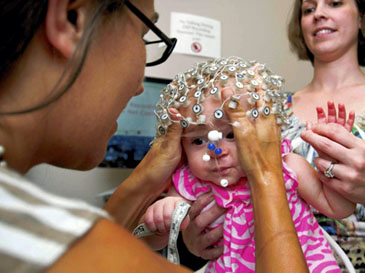Our Commitment to Research
Our faculty ranks include accomplished researchers who have made substantial contributions to the advancement of science in our field. The Department of Psychology and Neuroscience is consistently ranked in the top four departments in the College in terms of the external grant funding that is generated by the faculty and we were recently ranked 1st in the National Science Foundation survey for total Research and Development Funding. Read more about our reputation and accomplishments.
 We have identified a series of cross-cutting themes that have been particularly successful in securing external funding and thus in bringing distinction to our Department: research in drug and alcohol abuse; health psychology, including the study of stress and the immune system, as well as the psychological aspects of medical illnesses; developmental science, including the study of early child care; cognition across the lifespan, including memory research in young children and the elderly, and cognitive neuroscience. Our department has six sub-fields of Psychology and Neuroscience; each of these are represented in research below.
We have identified a series of cross-cutting themes that have been particularly successful in securing external funding and thus in bringing distinction to our Department: research in drug and alcohol abuse; health psychology, including the study of stress and the immune system, as well as the psychological aspects of medical illnesses; developmental science, including the study of early child care; cognition across the lifespan, including memory research in young children and the elderly, and cognitive neuroscience. Our department has six sub-fields of Psychology and Neuroscience; each of these are represented in research below.
Behavioral and Integrative Neuroscience
The primary focus of Behavioral and Integrative Neuroscience is to understand the biological basis of behavior. A central research theme in our program is to understand biological mechanisms underlying drug addiction including neural mechanisms mediating drug-seeking behaviors, pharmacological mechanisms underlying the analgesic and rewarding properties of abused substances, and the effects of abused substances on the immune system. In this regard, faculty conduct research using state-of-the-art experimental approaches including sophisticated behavioral assays, molecular and cell biology techniques, neuroimaging, electrophysiology, electrochemistry, and molecular genetic tools. Read more about our faculty’s research interests.
Clinical Psychology
Faculty research in Clinical Psychology encompasses a wide range of topics, ranging from the causes of psychological disorders and the psychological mechanisms underlying symptoms, to applied domains involving the development and evaluation of intervention and assessment instruments. Several major themes emerge in faculty research, including the study of the nature of psychopathology, the effectiveness of psychotherapy interventions, prevention, and therapy, health psychology, interpersonal relationships, and the study of ethnic minority issues related to psychological health. Read more about our faculty’s research interests.
Cognitive Psychology
Cognitive Psychology is the scientific study of mental processes underlying behavior, a broad research area encompassing the study of attention, perception, memory, language, reasoning and problem-solving. These research areas are strongly represented by the faculty of the Cognitive Psychology Program along with research on cognitive aging and cognitive neuroscience. The primary research method is behavioral experimentation with humans (both college-aged adults and healthy older adults). Other important methods use neuroimaging technologies (such as fMRI and ERP), which allow us to correlate neural processing with cognitive function, eye-tracking technologies, which allow for the study of reading and visual perception, and experimentation with special neurological populations, whose cognitive deficits can inform our understanding of the effects of brain damage on normal cognition. Read more about our faculty’s research interests.
Developmental Psychology
Faculty in the Developmental Psychology Program are interested in many of the same cognitive and social phenomena as our colleagues in other Programs, but with a specific focus on how these phenomena emerge, stabilize, and change as a function of maturation and experience. Thus, we conduct research on infancy, childhood, and adolescence, using either cross-sectional designs in which age is an independent variable or longitudinal designs in which individuals are assessed over days, months, years, or generations. We imbed our research within the physiological context of neural, hormonal, and physical maturation, and within environmental contexts such as the parent-child dyad, the family, the classroom, and the community. Read more about our faculty’s research interests.
Quantitative Psychology
Internationally known for research and training in quantitative and statistical methods for psychological research, our Quantitative Psychology faculty have methodological interests in measurement theory, survey methods, and methods for analysis of correlational data. Our methodological research focuses on education diversity, structure of personality, issues in health psychology, statistical techniques for the study of change over time, and development and adaptation of modeling and analysis tools that are suited to evaluating linear and nonlinear dynamical systems models. All of our faculty are active in interdisciplinary substantive research in a variety of fields, including educational testing, substance abuse, child development, developmental psychopathology, and diversity in education. In this work, these faculty bring their quantitative and substantive expertise to enhance design and analysis of empirical research projects. Read more about our faculty’s research interests.
Social Psychology
Faculty research in Social Psychology encompass many core areas of the field, with a particular strength in affective processes as it relates to well-being, attitudes and stereotyping, and social judgment and decision-making. Faculty research interests are broad and include attitudes and attitude change, decision making, social cognition, emotions, stereotyping and prejudice, interpersonal processes, and group interactions. Read more about our faculty’s research interests.

